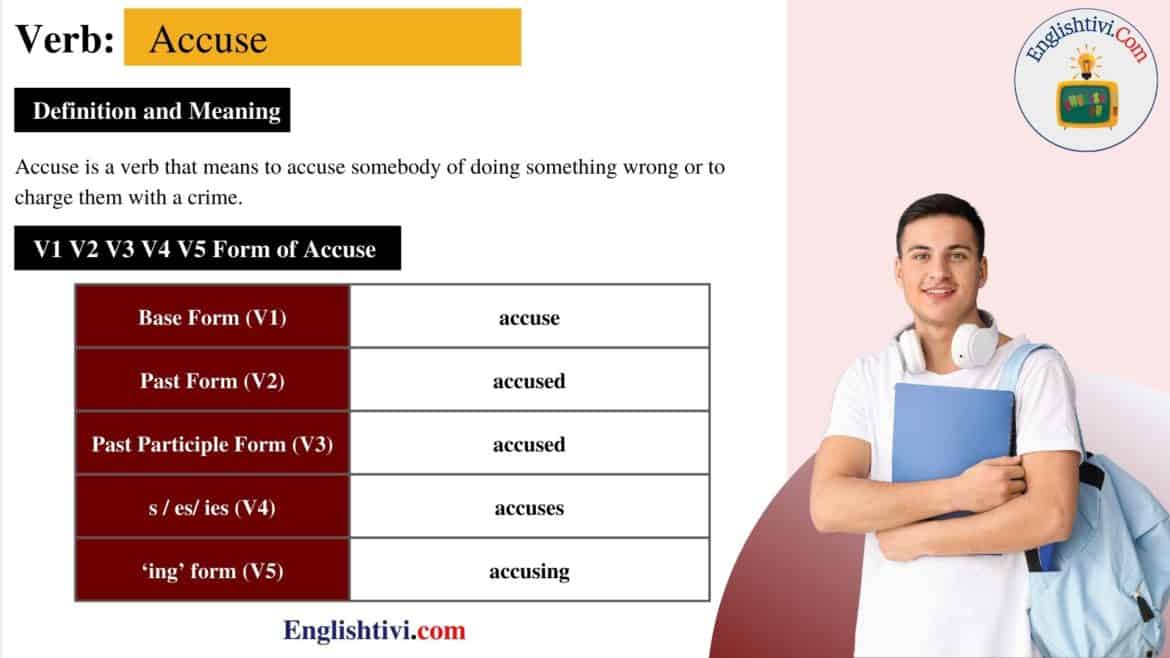Accuse V1 V2 V3 V4 V5 is one of the verbs that are used very commonly in English tests as well as in everyday communication. Also, because it’s an irregular verb, accuse doesn’t follow the regular rule. The verb “accuse” has five different forms: base form, past simple, past participle form, present perfect, and present perfect participle. So what is accuse‘s past? How do conjugate verbs with accuse verbs?
⏩ Sign Up to Get Bonus
Let’s find out with English tivi in the article below.
See more at: Verbs
Accuse of Definition and Meaning
Accuse is a verb that means to accuse somebody of doing something wrong or to charge them with a crime.
V1 V2 V3 V4 V5 Form of Accuse
| Base Form (V1) | accuse |
| Past Form (V2) | accused |
| Past Participle Form (V3) | accused |
| s / es/ es (V4) | accuses |
| ‘ing’ form (V5) | accusing |
Accuse of Past Simple V2
The verb Accuse is also employed in its V2 form as “accused”’. It is used to indicate the past tense in sentences.
Accuse of Past Participle V3
The V3 form is identical to the V2 form. The V3 form is “accused”. Accused is used in the past or present perfect tense.
+ In the present perfect tense, we use the word V1 as ‘have + accused‘ or ‘has + accused'.
- I, you, and we are used as ‘have + accused‘.
- ‘has + accused' is used for he, she, and it.
+ If you need to use the past perfect tense, use ‘had + accused‘ regardless of the subject.
You might also like: ALL the English Grammar Basics You Need
Conjugation of Accuse V1 V2 V3 V4 V5
Conjugation table: Accuse | |||
| Number | Singular | ||
| Present Simple of accuse | I | You | She/He/It |
| accuse | accuse | accuses | |
| Plural | |||
| We | You | They | |
| accuse | accuse | accuse | |
| Present Continuous of accuse | I | You | She/He/It |
| am accusing | are accusing | is accusing | |
| Plural | |||
| We | You | They | |
| are accusing | are accusing | are accusing | |
| Present Perfect of accuse | I | You | She/He/It |
| have accused | have accused | has accused | |
| Plural | |||
| We | You | They | |
| have accused | have accused | have accused | |
| Present Perfect Continuous of accuse | I | You | She/He/It |
| have been accusing | have been accusing | has been accusing | |
| Plural | |||
| We | You | They | |
| have been accusing | have been accusing | have been accusing | |
| Past Simple of accuse | I | You | She/He/It |
| accused | accused | accused | |
| Plural | |||
| We | You | They | |
| accused | accused | accused | |
| Past Continuous of accuse | I | You | She/He/It |
| was accusing | were accusing | was accusing | |
| Plural | |||
| We | You | They | |
| were accusing | were accusing | were accusing | |
| Past Perfect of accuse | I | You | She/He/It |
| had accused | had accused | had accused | |
| Plural | |||
| We | You | They | |
| had accused | had accused | had accused | |
| Past Perfect Continuous of accuse | I | You | She/He/It |
| had been accusing | had been accusing | had been accusing | |
| Plural | |||
| We | You | They | |
| had been accusing | had been accusing | had been accusing | |
| Future Simple of accuse | I | You | She/He/It |
| will/shall accuse | will/shall accuse | will/shall accuse | |
| Plural | |||
| We | You | They | |
| will/shall accuse | will/shall accuse | will/shall accuse | |
| Future Continuous of accuse | I | You | She/He/It |
| will/shall be accusing | will/shall be accusing | will/shall be accusing | |
| Plural | |||
| We | You | They | |
| will/shall be accusing | will/shall be accusing | will/shall be accusing | |
| Future Perfect of accuse | I | You | She/He/It |
| will/shall have accused | will/shall have accused | will/shall have accused | |
| Plural | |||
| We | You | They | |
| will/shall have accused | will/shall have accused | will/shall have accused | |
| Future Perfect Continuous of accuse | I | You | She/He/It |
| will/shall have been accusing | will/shall have been accusing | will/shall have been accusing | |
| Plural | |||
| We | You | They | |
| will/shall have been accusing | will/shall have been accusing | will/shall have been accusing | |
| Conditional Present of accuse | I | You | She/He/It |
| would accuse | would accuse | would accuse | |
| Plural | |||
| We | You | They | |
| would accuse | would accuse | would accuse | |
| Conditional Perfect of accuse | I | You | She/He/It |
| would have accused | would have accused | would have accused | |
| Plural | |||
| We | You | They | |
| would have accused | would have accused | would have accused | |
| Conditional Present Continuous of accuse | I | You | She/He/It |
| would be accusing | would be accusing | would be accusing | |
| Plural | |||
| We | You | They | |
| would be accusing | would be accusing | would be accusing | |
| Conditional Perfect Continuous of accuse | I | You | She/He/It |
| would have been accusing | would have been accusing | would have been accusing | |
| Plural | |||
| We | You | They | |
| would have been accusing | would have been accusing | would have been accusing | |
| Present Subjunctive of accuse | I | You | She/He/It |
| accuse | accuse | accuse | |
| Plural | |||
| We | You | They | |
| accuse | accuse | accuse | |
| Past Subjunctive of accuse | I | You | She/He/It |
| accused | accused | accused | |
| Plural | |||
| We | You | They | |
| accused | accused | accused | |
| Past Perfect Subjunctive of accuse | I | You | She/He/It |
| had accused | had accused | had accused | |
| Plural | |||
| We | You | They | |
| had accused | had accused | had accused | |
| Imperative of accuse | I | You | She/He/It |
| accuse | |||
| Plural | |||
| We | You | They | |
| Let’s accuse | accuse | ||
See more at: Vocabulary
Example Sentences with Accuse V1 V2 V3 V4 V5
In this section, we will learn about accuse sentence examples:
- “I had nothing to do with it.” “Don't worry; I'm not going to accuse you.”
- Because she stole or killed someone, she has been accused of these crimes.
- The doctor was accused of being irresponsible.
- She is accusing me of stealing her money.
- He accuses her of making the decision without consulting anyone.
Synonym Words For Accuse
Synonym of accuse word list. Here are a variety of words whose meaning is nearly the synonym of accuse:
- charge
- indict
- incriminate
- blame
- impeach
- inculpate
- arraign
- prosecute
- implicate
- denounce
- sue
- frame
- censure
Opposite Words For Accuse
The antonym of accuse word list. Here are some words that have nearly the opposite meaning as accuse:
- absolve
- exonerate
- clear
- vindicate
- acquit
- exculpate
- applaud
- approve
- commend
- compliment
- protect
- retreat
- support
You might also like: Best List of Irregular Verbs in English
Some Frequently Asked Questions About Accuse (Verb)
What is the V1 V2 V3 V4 V5 of accuse?
The past tense of accuse is accused. The third-person singular simple present indicative form of accuse is accuses. The present participle of accuse is accuseing. The past participle of accuse is accused.
| Base Form (V1) | accuse |
| Past Form (V2) | accused |
| Past Participle Form (V3) | accused |
| s / es/ es (V4) | accuses |
| ‘ing’ form (V5) | accusing |
What is the V2 and V3 form of accuse?
+ The V2 and V3 form of accuse is “accused“.
What is the sentence of accuse?
What is the past tense V2 of accuse?
+ The past tense of accuse is “accused“.
What is the past participle V3 of accuse?
+ The past participle of accuse is “accused“.
What is the present participle V5 of accuse?
+ The present participle of accuse is “accusing“.
Conclusion
Let’s learn with English TV the structure of the verb “Accuse V1 V2 V3 V4 V5“: Base Form, Past Simple, Present Continuous and Present Continuous and Present Continuous and Present Continuous forms. We wish you all the best of luck.
You should subscribe to the English TV YouTube channel if you want to learn more about the English language and improve your proficiency.





